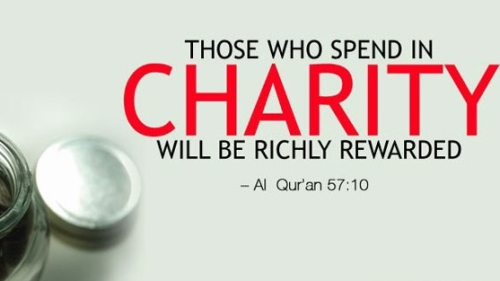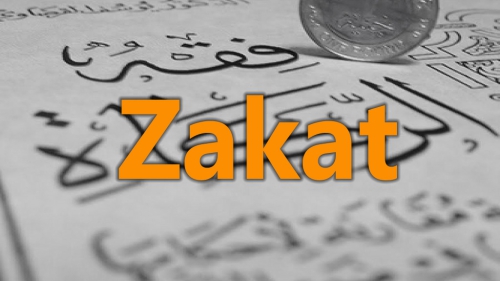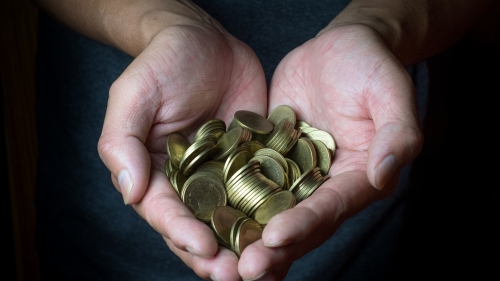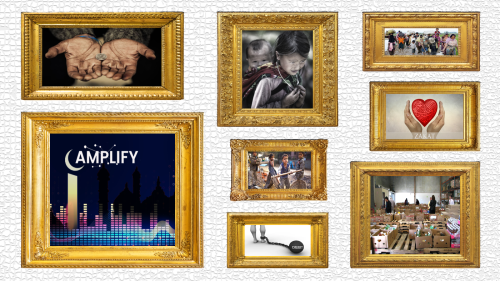Can Man Ever Be Rich?

Once while describing an aspect of man’s fundamental nature, Prophet Muhammad (pbuh) said that the son of Adam becomes old with senility, but yet two things remain with him intact: greed and hope (Sahih al-Bukhari).
The Prophet (pbuh) also taught that when the latter two become unrestrained, taking over a person’s total being, he with his actions and decision making, in turn, becomes uncontrollable. He stops at nothing in order to try to satisfy his raging impulses. No action, or word, that comes from such a person should be seen as a surprise.
The Prophet (pbuh) thus said that if the son of Adam possessed two valleys of gold, he would long for a third one; “and nothing would fill (satiate) the stomach – or the mouth -- of the son of Adam but dust (that is, after he dies)” (Sahih Muslim).
Man can easily become a world of paradoxes. Under the pressure of his recurring misjudgments, his inborn disposition and a myriad of external factors and forces, man can easily give in to the advances of his perennial anxieties, unfounded optimism and profligacy, relegating the transcendent power of his reason (intellect or ‘aql), as well as his primordial nature (instinct or fitrah), to the backseat. One moment he can think and act like an angel; the next he can be like a devil.
The similar thing Satan (Iblis) had in mind when he plotted to deceive Adam and his wife Eve (Hawa) and drive them out from the Garden of Eden. He whispered to them, coaxing them: “Shall I lead you to the Tree of Eternity and to a kingdom that never decays?” (Ta Ha, 120).
Also: “Your Lord only forbade you this tree lest you should become angels or such beings as live forever (immortals)" (al-A’raf, 20).
Why is man intrinsically unsatisfied and greedy, and is that a bad thing in itself?
Man has been created for the splendid purpose of vicegerency (khilafah) on earth. As the pinnacle of Almighty God’s act of creation -- whom God had created and fashioned with His Own Hands (Sad, 75) and in His Own Image (Sahih Muslim) – man signifies both the essence of the creation phenomenon and its microcosm, as much physically as metaphysically.
Man exists in order to recognize the truth, embrace it and live it in every undertaking of his. This could be interpreted as being equivalent to knowledge, in which case man would have been created to know; or to productivity, in which case man would have been created to work and be productive as well as beneficial to himself and his animate and inanimate surroundings, generating cultures and civilizations in the process; or to moral integrity, in which case man would have been created in order to possess an internally consistent framework of values and principles that would ensure moral consistency in the external world of actions, decisions, methods, measures and codes.
Almighty God terms this as follows: “I have only created jinns and men that they may serve (worship) Me” (al-Dhariyat, 56). This implies, firstly, man’s cognition of the existence of his Creator and Master, and, secondly, man’s conforming of his existence to whatever he may perceive of the divine Will and Plan.
That also means that each creature is given the chance of development and progress towards the Goal, which is Allah. “Allah is the source and center of all power and all goodness, and our progress depends upon our putting ourselves into accord with His Will. This is His service. It is not of any benefit to Him; it is for our own benefit” (Abdullah Yusuf Ali).
Moreover, every living reality in the heavens and on the earth has been subjected to man and his noble existential mission. Everything partially exists only due to the existence of man, serving him and facilitating the fulfilment of his extraordinary assignments.
Consequently, God has conferred dignity on man, honoring him greatly and favoring him far above the rest of creation (al-Isra’, 70).
Man -- both the believer and nonbeliever -- easily comprehends his superior status and position, and what he has gotten. He swiftly develops a deep affection for the favors and possessions. Seeing how perfectly meaningful and beneficial they are for his subsistence, man naturally starts craving for as much of those gifts, kindnesses and provisions as possible.
In addition, seeing that he is entirely dependent on them and that no segment of his physical, intellectual and spiritual life could be extricated from and lived in isolation from the matrix of those benefits, provisions and gifts, just a thought of losing any of them, or of being unable to fully delight in them, fills man with dread.
That is why man is most terrified of the notions of death and the permanent loss of any of the granted benefits. Though death, as the destroyer of all pleasures and dreams, is unavoidable, man will never stop fantasizing about an immortal world. As an illustration of one of the biggest paradoxes in man, man will even try to undertake some vain steps towards the actualization of such an imaginary world.
However, those feelings are natural and fully consistent with the inherent nature of man. In principle, there is nothing wrong with them. Man has been tested thereby, and the problem is not the test itself, but how man copes with it and performs. The question is how man prioritizes his yearnings and needs, and how he adjusts them to his life undertakings.
It is completely ordinary that man wants to possess as much as possible, and that he wants neither his possessions, nor himself, to perish or “die”. However, death is as real and undeniable as man’s fear of it and his pining for immortality. That there is no way for any sort of reconciliation between the two extremes would be unfair. There must be a way out for man to satisfy his cravings. But what is it, and what is actually meant by being rich, wanting more, wishing for immortality, etc.?
Man is a dual being, consisting of a physical and spiritual dimension. The two are to be integrated in such a way that the latter is to be regarded as a goal and the former a means. Furthermore, the latter’s existence is at once real and ultimate, whereas the former’s is conditional and relative, existing only because of the existence of the soul and serving as its carrier.
The soul, it follows, is to be of a primary, and the body of a secondary, concern to man. The body and its requisites are to always play second fiddle to the soul and its own requisites. The soul is eternal, while the body perishes.
Thus, man’s inborn and everlasting insatiability and hopes are to be directed towards that which is also everlasting, absolute and innately appealing to the former, that is, the absolute truth and everything that goes with it. Only then will man truly feel happy and satisfied, because the two are meant for each other.
The solution is that man turns his full attention to the real and permanent truth inside and around himself, cultivating it and reaping its benefits for the good of this world and the Hereafter, leaving the perishable to the perishable to perish, lest he gets contaminated with its unfavorable repercussions and effects. Man should avail himself of the impermanent only as much as necessary for the attainment of the permanent.
It is grievously wrong that man makes relative, material and so, transitory things and experiences the target of his intrinsic and perennial “greed”. The two will never be compatible, as they are worlds apart in terms of their respective meanings, scopes and operations. Amassing and enjoying only material things will never make man truly happy and satisfied, since such a life pattern goes against the fundamental spiritual and moral laws of existence. The benefits generated thereby are nothing but illusory, temporary and superficial in character. Such a prospect by no means will appeal to an enlightened, guided and spiritually charged individual.
Thus, a greedy person with materialistic tendencies will never acquire a quantity of possessions and things which will make him feel he has enough and is genuinely rich. He will be obsessed with numbers, whereas being rich and satisfied is never about numbers, or statistics. He will be preoccupied with exteriors, forms and sheer means, whereas being rich and happy is all about the soul, and to some extent, the mind. Being rich is a state of the soul and mind. A person is rich if he feels thus, and another is poor if he feels like so.
Accordingly, the Prophet (pbuh) once explained that whoever makes this world, rather than the Hereafter, his most important matter, God will confound his affairs and make poverty appear before his eyes (Sunan Ibn Majah), so wherever he wants to look and whatever he wants to see, he will see only poverty. Poverty will become his greatest fear and the actual condition of his mind and soul. But whoever makes the Hereafter his most important matter, the Prophet (pbuh) continued: “Allah will settle his affairs and make him content in his heart and the world will come to him although he does not want it.”
Similarly, a Companion Abu Dharr reported that the Prophet (pbuh) said to him: “O Abu Dharr, do you say an abundance of possessions is wealth?” I said: “Yes”. The Prophet (pbuh) said: “Do you say a lack of possessions is poverty?” I said: “Yes”. The Prophet (pbuh) repeated this three times, then he said: “Wealth is in the heart and poverty is in the heart. Whoever is wealthy in his heart will not be harmed no matter what happens in the world. Whoever is impoverished in his heart will not be satisfied no matter how much he has in the world. Verily, he will only be harmed by the greed of his own soul” (al-Tabarani; Hadith is Sahih according to al-Albani).
The Prophet (pbuh) also said: “Richness does not lie in the abundance of (worldly) goods, but richness is the richness of the soul (the heart)” (Sahih Muslim).
Realizing that authentic wealth, coupled with satisfaction and true happiness, is eluding him, a greedy materialistic person will seek solace and potential answers in accumulating extra possessions. He will be caught in a vicious circle; he will be in a state of despondency because of his avarice and insatiability, while his insatiable greed will grow ever larger because of his wish to overcome despondency. That situation is tantamount to a gradual spiritual suicide.
This will go on until his greed consumes him and he becomes its slave. It will go on until he stops controlling his wealth, becoming controlled by it instead, and until he stops keeping his wealth in bank accounts, wallets, bags and pockets, and starts keeping it in his heart. He will feel so much dependent on his wealth and in need of it for ostensibly satisfying his endless materialistic whims and needs, that he, in fact, will become a bona fide needy – not rich -- person. He will not take care of other needy individuals, such as orphans, the poor and the homeless, because, in reality, he is needier and more destitute than all of them. He will need more help than them.
Bogged down and suffocated by rampant materialism, agnosticism and hedonism, the modern man’s lifestyle sways from one extremity to another. For example -- as nicely said by Bob Moorehead – today people spend more, but have less, they buy more, but enjoy less. They have bigger houses, but less warmth and smaller families in them, more conveniences, but less time. They own houses, but not homes. They have more degrees but less sense, more knowledge, but less judgment and wisdom, more experts, yet more problems, more medicine, but less wellness. They have multiplied their possessions, but reduced their values. They have learned how to make a living, but not a life. They have done larger things, but not better things.
It goes without saying that being rich or poor is not about how much a person has or does not have, but how much and what exactly he needs. In the physical and perishable world, there is no richness. There are only infinite and unquenchable need, indigence and want, each one of which denotes the antithesis of the true meaning and experience of richness and affluence.
Ontologically, man is not meant for such a world, nor does he belong to it. He is assigned to it temporarily -- like a traveler being in transit – with an aim to rise above it and transcend its drawbacks, dwelling then on a higher plane of existential certitude. It is therefore most unnatural, unreasonable, barren and so, painful for man to recognize the physical world as the ultimate and only reality and home.
The Prophet (pbuh) advised: “Be in this world as though you were a stranger or a wayfarer.” The narrator of this hadith, Ibn ‘Umar, used to say: “In the evening do not expect (to live until) the morning, and in the morning do not expect (to live until) the evening. Take (advantage of) your health before times of sickness, and (take advantage of) your life before your death” (Sahih al-Bukhari).
The Prophet (pbuh) also said: “Verily, the example of this world and myself is that of a rider who seeks shade under a tree, then he moves on and leaves it behind” (Musnad Ahmad).
The similitude of a greedy materialistic individual is that of a bottomless pit. No matter what and how much is poured into it, it will always be empty; it will always ask for more. It is not a coincidence, therefore, that on the Day of Judgment, Hellfire (Jahannam), the abode of the faithless and evil, will be personified and asked: “Are you full?” It will reply: “Are there any more (to come)?” (Qaf, 30). It is both fair and expected that punishments correspond to crimes, including their type, scale and overall character. The Qur’an portrays the life of the misguided and wicked ones as “the mutual rivalry for piling up (worldly gains)” (al-Takathur, 1), and “play and amusement, a show and boasting among yourselves, a quest for greater riches and more children” (al-Hadid, 20).
Hence, for a person to reach the state of actual richness and experience its bliss, he must free himself from the fetters of materialistic worldviews, tendencies and practices, selflessly plunging himself into the spiritual realm with totally different outlooks, beliefs and traditions. He will then see that the spiritual kingdom is the only place for quenching his inborn hunger and greed, for making him rich and utterly satisfied, for pursuing his own “immortality” and permanence and the “immortality” and permanence of his assets, and for overcoming all those fears, doubts and uncertainties as accompany him on his existential journey.
All that will be possible on account of his soul, which, after it had been duly purified, was able to bring under control his body and its animal desires. The Qur’an says: “Truly he succeeds that purifies it (the self), and he fails that corrupts it” (al-Shams, 9, 10).
Having subscribed to and become a member in the spiritual kingdom, a person becomes relatively rich because he finds and “owns” his self and the truth. He also “owns” his ultimate destiny. He likewise knows that he has Almighty God, angels and all good men and women on his side. He and all his possessions thus belong completely to his Creator and Master -- the Originator and Owner of everything -- knowing that God takes care of what is His.
A person feels rich because he gave up his self to the service of God. He feels that he owns because he is owned. He feels that he is given because he gives. He feels confident and “immortal” because he is assured that his spiritual legacy and spiritual possessions in the form of good deeds will not come to an end, nor will they be wasted.
A person further feels real, living in a real world with all the real things, experiences and dreams. There is no place in such a world for fiction, illusions and false hopes. Inasmuch as he essentially was meant for, and belongs to, the spiritual world, he feels at home while associated with it. That makes him avoid the agony of what could be called a spiritual homelessness.
However, in the sense that he will become a totally independent and self-sufficient being, man will never be rich. He will always depend on his Creator, Almighty God, needing Him for everything: His guidance, sustenance, provisions, sustainability of the earth and existence as a whole, and countless physical, spiritual, cerebral and moral laws based on which only can man discharge his honorable vicegerency mission.
Almighty God thus proclaims: “O mankind! It is you who stands in need of Allah (poor), and it is Allah Who is free of all wants, worthy of all praise” (Fatir, 15). People are called hereby needy or poor, needing at all times and for everything God and His grace and providence. It is only Him Who is Rich, in the sense that He is independent and does not need creation (free of all needs and wants). Hence, one of the beautiful Names of God is Ghaniyy, which means the “Rich” or Self-Sufficient One.
But such a realization, undoubtedly, will constitute the best thing as far as man’s partial and regulated richness while in this world is concerned. The true reality of this type of richness is that the servant of God is independent of anything except God. He is only in need of Him. He does not seek richness by means of material things. Rather, he does so by means of shunning them. He does not need them; he only moderately uses them. The less he has of worldly possessions, the more he actually has. The more he has of spiritual bounties, the less he needs of material things. In other words, the less is more. Neither satisfaction, nor happiness, could be found in other than God.
And it is in the spiritual sphere that man should exercise and foster his inherent “greed” and hankering for a higher order of meaning and purpose. It is there that man should stop at nothing legitimate so as to make sure he succeeds in that which he has been created for, hastening to all that is genuinely good and competing with others in serving and performing good deeds. Man should never feel he has done enough, resting on his spiritual laurels, for Paradise (Jannah), the abode of the faithful and righteous, is so splendid and real that striving for it should be accorded all attention, energy and dedication.
Finally, before he became a prophet at the age of forty, Prophet Muhammad (pbuh) was relatively well-off, living a comfortable life. However, following his prophet-hood, he devoted everything he had of time, possessions and energy to the purpose, rendering himself and his family rather poor.
Nonetheless, the Holy Qur’an depicts a different picture. It asserts that Prophet Muhammad (pbuh) before his prophet-hood was poor, but after it, he became rich: “And He found you in need (poor) and made you self-sufficient (rich)” (al-Duha, 8).
Despite his reasonable wealth, the Prophet (pbuh) was poor before his prophet-hood because he was not a prophet, was not a cognizant servant of God, and wandered in quest of the ultimate meaning and truth of life. But after that, despite his material hardships, he became rich because he became a prophet, he found himself and the absolute truth in the form of the message of Islam, the Qur’an and heavenly wisdom (sunnah), and was enriched with God’s providence and care, with the presence and help of angels, and with the community of believers and its principled mission and goals.
Certainly, there could be no better prosperity than that.
Topics: Greed, Materialism, Money, Wealth
Views: 5104
Related Suggestions

















